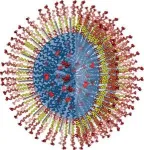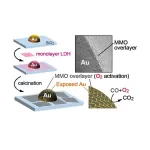(Press-News.org) WINSTON-SALEM, N.C. – March 4, 2024 – Parkinson’s disease is a neurological disorder that affects movement and muscle control. One characteristic of the disease is the deficiency of dopamine, a neurotransmitter or brain chemical that plays a role in movement and can impact how people think and feel.
Dopaminergic medicines can help alleviate the symptoms of Parkinson’s disease. However, in some patients, the medications can cause impulse control disorder (ICD), characterized by risky behavior such as excessive gambling, shopping, sexual activity or eating.
In a new study, published online today in Scientific Reports, researchers found differences in how people with ICD process the consequences of their actions compared to those without ICD, both on and off medication.
“Our goal was to investigate how factors that influence the decision-making process may also affect how people feel in patients with and without ICD,” said Kenneth Kishida, Ph.D., corresponding author of the study and an associate professor of translational neuroscience and neurosurgery at Wake Forest University School of Medicine.
For the study, researchers recruited 30 people with Parkinson’s disease—18 individuals also had ICD and 12 individuals did not have ICD. All study participants performed a simple computer task in two different states—while on their dopaminergic medications and while off their dopaminergic medications.
The task presented repeated trials of risky choices (gambles) that consisted of a “sure bet” or a “gamble.” The “sure bet” was a guaranteed small amount of money, whereas the “gamble” was a 50-50 outcome of two different amounts of money. After the study participants made their choice, they were shown the outcome of their decision.
The participants were occasionally asked to rate how they felt about their outcome. The research team then used computational models to analyze the data.
“We found that participants with ICD showed a significant difference in the factors that drive their feelings about the risky decisions that they made,” Kishida said. “Compared to the non-ICD group, patients with ICD were not as affected by the consequences of their actions (good or bad). This was true regardless of their medication state.”
When patients with ICD were on their medications, the researchers found that their expectations drove their feelings significantly more than when they were off of their medications. This difference was not observed for patients without ICD.
“These results suggest that patients with ICD may get positive feelings from taking risky actions based on their expectations of good outcomes. But, when those risky choices do not pan out, they do not process the negative feedback in a typical way,” Kishida said. “It may mean that these patients, when in a medicated state, may enjoy risky choices for the sake of risky choices, and they do not modulate their feelings in an appropriately negative way when the results are poor.”
Kishida said the findings might have implications for understanding the impact of dopaminergic drugs on behavior more generally and may provide clues about how addictive substances (such as nicotine, cocaine, or alcohol) may influence subjective feelings about risky behaviors or decision-making more generally.
“This study provides insight into the psychological and behavioral aspects of Parkinson’s disease, especially in the context of medication-induced side effects,” Kishida said. “It also contributes to a broader understanding of how dopaminergic drugs and addictive substances influence decision-making processes and subjective feelings related to risky behaviors.”
END
Study shows differences in how patients with impulse control disorder process consequences
Research sheds light on the relationship between dopamine and decision-making
2024-03-04
ELSE PRESS RELEASES FROM THIS DATE:
Improving access to early-stage lung cancer care in Europe
2024-03-04
There are stark differences between European countries when it comes to both the reimbursement of, and access to, new treatments for patients with early-stage lung cancer. There are also differences in reimbursement times and indications between the European Medicines Agency (EMA) and the US Food and Drug Administration (FDA). Researchers from Amsterdam UMC Cancer Center Amsterdam analysed the landscape, and their results are published today in The Lancet Regional Health Europe as part of a series on the latest developments in the treatment of this lung cancer.
"Tackling inequalities in access to care must be a common European priority," ...
Low iron levels resulting from infection could be key trigger of long COVID
2024-03-04
Problems with iron levels in the blood and the body’s ability to regulate this important nutrient as a result of SARS-CoV-2 infection could be a key trigger for long COVID, new research has discovered.
The discovery not only points to possible ways to prevent or treat the condition, but could help explain why symptoms similar to those of long COVID are also commonly seen in a number of post-viral conditions and chronic inflammation.
Although estimates are highly variable, as many as three in 10 people infected with SARS-CoV-2 could go on to develop long COVID, with symptoms including fatigue, ...
Swapping meat for Quorn lowers bad cholesterol by 10-percent
2024-03-04
Regularly substituting meat for mycoprotein such as Quorn could help to lower bad cholesterol by 10-percent, which is comparable to switching to a Mediterranean or vegan diet.
New research by the University of Exeter, published in Clinical Nutrition, also found substituting meat for Quorn reduces blood glucose and c-peptide concentrations associated with diabetes, cardiovascular disease and all-cause mortality.
With one in six UK adults suffering from raised cholesterol, the findings indicate that mycoprotein - the high protein, high-fibre food source that’s the main ingredient in Quorn - could play a key role in ...
We must stop technology-driven AI and focus on human impact first, global experts warn
2024-03-04
We need to stop designing new AI technology just because we can, causing people to adapt practices, habits and laws to fit the new technology; instead we need to design AI that fits exactly with what we need, according to human-centred AI advocates.
Fifty experts from around the world have contributed research papers to a new book on how to make AI more ‘human-centred,’ exploring the risks — and missed opportunities — of not using this approach and practical ways to implement it.
The experts come from over 12 countries, including Canada, France, Italy, Japan, New Zealand and the UK, and more ...
NCI-MATCH cancer trial discovers a potentially broader role for an established dual HER2-blocking treatment
2024-03-04
An important discovery from the NCI-MATCH precision medicine initiative is being published today in Clinical Cancer Research, a journal of the American Association for Cancer Research. Trastuzumab-pertuzumab, a drug combination approved by the US Food and Drug Administration (FDA) to treat patients with human epidermal growth factor receptor 2 (HER2)-positive breast cancer, shrunk tumors in patients with several other types of cancer with high levels of the HER2 gene. NCI-MATCH (Molecular Analysis for Therapy Choice) is one of the first ...
Obesity a risk factor for stillbirth, especially at term
2024-03-04
Obesity is a risk factor for stillbirth, and the risk increases as pregnancy advances to term, according to a large study published in CMAJ (Canadian Medical Association Journal) https://www.cmaj.ca/lookup/doi/10.1503/cmaj.221450.
The overall risk of stillbirth in pregnancy is approximately 0.4% in Canada. "Our findings suggest that an earlier delivery date may help reduce the risk of stillbirth for pregnant people with obesity," says lead author Dr. Naila Ramji, a high-risk pregnancy specialist in Fredericton, New Brunswick, and ...
Pioneering research reveals empathetic communication can help overcome vaccine hesitancy
2024-03-04
An international study has shown for the first time how empathetic correction of misinformation among vaccine-hesitant patients can significantly improve attitudes towards vaccination – and potentially boost vaccine uptake.
The research, led by the University of Bristol, also found this new style of communication could help build and maintain a positive relationship with health professionals, increasing trust and public confidence. With the UK currently facing a growing measles outbreak, fuelled by declining rates of the Measles, ...
Rare astrolabe discovery reveals Islamic – Jewish scientific exchange
2024-03-04
The identification of an eleventh century Islamic astrolabe bearing both Arabic and Hebrew inscriptions makes it one of the oldest examples ever discovered and one of only a handful known in the world. The astronomical instrument was adapted, translated and corrected for centuries by Muslim, Jewish and Christian users in Spain, North Africa and Italy.
Dr Federica Gigante, from Cambridge University’s History Faculty, made the discoveries in a museum in Verona, Italy, and published them today in the journal Nuncius.
Dr Gigante first came across a newly-uploaded ...
Sleep apnea symptoms linked to memory and thinking problems
2024-03-03
EMBARGOED FOR RELEASE UNTIL 4 P.M. ET, SUNDAY, MARCH 3, 2024
MINNEAPOLIS – People who experience sleep apnea may be more likely to also have memory or thinking problems, according to a preliminary study released today, March 3, 2024, that will be presented at the American Academy of Neurology’s 76th Annual Meeting taking place April 13–18, 2024, in person in Denver and online. The study shows a positive association but did not determine whether sleep apnea causes cognitive decline.
Sleep ...
Nanoscale topcoat can turbocharge supported gold nanoparticle catalysts
2024-03-02
Tokyo, Japan – Researchers from Tokyo Metropolitan University have developed a way to add single nanosheets of mixed metal oxide to gold nanoparticles supported on silica to enhance their catalytic activity. Converting carbon monoxide to carbon dioxide, they found that the temperature required for the reaction was greatly reduced, with significant improvements over existing methods for coating gold/silica structures. The method paves the way for the development of a wide range of new high-performance catalysts.
Gold nanoparticles, particles less than five nanometers in diameter, are known to be excellent catalysts ...
LAST 30 PRESS RELEASES:
A promising potential therapeutic strategy for Rett syndrome
How time changes impact public sentiment in the U.S.
Analysis of charred food in pot reveals that prehistoric Europeans had surprisingly complex cuisines
As a whole, LGB+ workers in the NHS do not experience pay gaps compared to their heterosexual colleagues
How cocaine rewires the brain to drive relapse
Mosquito monitoring through sound - implications for AI species recognition
UCLA researchers engineer CAR-T cells to target hard-to-treat solid tumors
New study reveals asynchronous land–ocean responses to ancient ocean anoxia
Ctenophore research points to earlier origins of brain-like structures
Tibet ASγ experiment sheds new light on cosmic rays acceleration and propagation in Milky Way
AI-based liquid biopsy may detect liver fibrosis, cirrhosis and chronic disease signals
Hope for Rett syndrome: New research may unlock treatment pathway for rare disorder with no cure
How some skills become second nature
SFU study sheds light on clotting risks for female astronauts
UC Irvine chemists shed light on how age-related cataracts may begin
Machine learning reveals Raman signatures of liquid-like ion conduction in solid electrolytes
Children’s Hospital of Philadelphia researchers emphasize benefits and risks of generative AI at different stages of childhood development
Why conversation is more like a dance than an exchange of words
With Evo 2, AI can model and design the genetic code for all domains of life
Discovery of why only some early tumors survive could help catch and treat cancer at very earliest stages
Study reveals how gut bacteria and diet can reprogram fat to burn more energy
Mayo Clinic researchers link Parkinson's-related protein to faster Alzheimer's progression in women
Trends in metabolic and bariatric surgery use during the GLP-1 receptor agonist era
Loneliness, anxiety symptoms, depressive symptoms, and suicidal ideation in the all of us dataset
A decision-support system to personalize antidepressant treatment in major depressive disorder
Thunderstorms don’t just appear out of thin air - scientists' key finding to improve forecasting
Automated CT scan analysis could fast-track clinical assessments
New UNC Charlotte study reveals how just three molecules can launch gene-silencing condensates, organizing the epigenome and controlling stem cell differentiation
Oldest known bony fish fossils uncover early vertebrate evolution
High‑performance all‑solid‑state magnesium-air rechargeable battery enabled by metal-free nanoporous graphene
[Press-News.org] Study shows differences in how patients with impulse control disorder process consequencesResearch sheds light on the relationship between dopamine and decision-making




